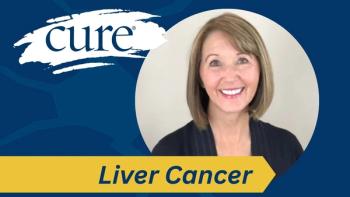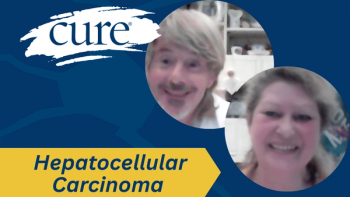
What Patients with Cholangiocarcinoma Should Be Prepared for When Joining a Trial
A clinical research coordinator discusses how patients with cholangiocarcinoma can get involved in clinical trials, such as the phase 3 PROOF trial, as well as what they should know once they are enrolled.
Cholangiocarcinoma is a rare cancer of the bile ducts that is often diagnosed in later stages. For patients who are not candidates for surgery or perhaps have failed other treatment interventions, clinical trials may offer a treatment path for patients who are eligible for investigational therapies that have not yet been approved by the Food and Drug Administration (FDA). For instance, patients with FGFR2 gene fusions/translocations, may be eligible to join the PROOF trial, a study investigating an oral agent specifically designed for patients matching that profile.
Many patients with cancer may not be familiar with what goes into being enrolled into a clinical trial. It is important to have a conversation with your physician about eligibility for clinical trials, so that you can learn about the risks and benefits of clinical trials, and why clinical trials represent opportunities not only potentially for you, but for other patients with this condition.
In an interview with CURE®, Daniel Pennington, a clinical research coordinator at the University of Arizona Cancer Center, discusses how patients with cholangiocarcinoma can get involved in clinical trials, what patients who are enrolled onto the phase 3 PROOF trial can anticipate, and what they should know once they are enrolled on the trial.
CURE: What are some ways patients with cholangiocarcinoma can join a clinical trial, particularly the PROOF trial?
Pennington: Most patients with cholangiocarcinoma end up having some kind of symptom — weight loss, abdominal pain, nausea, whatever it may be — and they end up in the hospital. Scans and images then may show they might have a mass or lesion and then they have a biopsy that shows that it may be cholangiocarcinoma. Pretty quickly after that, especially with cholangiocarcinoma, and in this trial, patients get referred to oncologists pretty quickly, because ultimately, the main goal is to get started on treatment as soon as possible. When they arrive in clinic, that's more when someone like me comes into play.
The patient is seen by an oncologist, who then comes to someone like myself and says, “I think this patient would benefit from this trial.” Especially with cholangiocarcinoma, anywhere between 10% to 15% of patients can have an FGFR2 fusion, which is what this specific treatment targets in the PROOF trial. And so, we then send patients off for molecular testing and get a baseline and make sure that they are eligible for the study.
At that point, I would come down, talk to the patient about the trial, and tell them the next steps that are going to happen. For example, we always have what they call a screening phase to make sure that they would be eligible for the trial on which, specifically for this trial, we'll be collecting tissue for the purpose of conducting genomic tests, we'll get some imaging assessments, go over all of their medical history, laboratory studies, EKG. And then another extra one in this instance is an echocardiogram, and then an ophthalmology assessment just to make sure that we get an accurate baseline for the patients.
We would wait for the genomic test to come back to see if there is an FGFR2 fusion in patients, and the PROOF trial has kind of expedited that because typically, it'll take three to four weeks. However, for this study we can expect results within 7 days from tissue receipt, depending on the lab used. So, they've really expedited that process to really allow the patients to have a better chance at enrolling in targeted clinical trials.
In the beginning, when they're on the trial, they come in for more frequent assessments because we're always trying to evaluate for safety and make sure that everything's going well. They do have repeat echocardiograms and repeat ophthalmology assessments. After the first couple of months, the assessments slow down a lot. After a while, we end up seeing them once every month, which is better than the required 2 out of every 3 weeks if patients were to be randomized to the chemotherapy arm.
If patients are randomized to receive the investigational oral treatment, then they can take the oral drug at home for three weeks on and one week off, and then we assess them for safety and then we check scans every eight weeks to really see if the drug is working, if the patient's disease is stable and what is going on. The real benefit from this study is that patients are randomized two to one, which means they have a 66% chance of getting the oral pill, and a 33% chance of getting randomized to the chemotherapy.
But what's cool is that if unfortunately, they've progressed while on chemotherapy in the trial, they have the opportunity to cross over and still get that oral drug. So that's a huge benefit that if the patient is willing to wait that little amount of time that it takes for us to get the FGFR2 fusion report back from the Mayo Clinic, then they'll at least, at some point in time on study, they may get the oral drug, whereas in most other clinical trials, it's this or this and that's it.
What are some of the inclusion and exclusion criteria patients should be aware of when determining if they want to be a part of a trial like the PROOF trial?
The biggest factor of this study is it is a frontline trial. So, patients can’t have had any treatment beforehand. In every trial there’s always time points where we must wait. For example, some patients might have had a resection.
Or, if you have had adjuvant therapy or chemotherapy, a certain amount of time has had to pass before they've had progression before they can qualify for the study.
For any clinical trial, is there an application process to get on the trial?
So, patients don’t have to apply for anything specifically. Each institution has its own consent form, which is varied a little with differing verbiage. When they consent, that allows us to get everything going. But they don’t have to go online and apply for something like this. Most of the time, someone like myself approaches the patient and says the doctor thinks they would qualify for this trial. And, that we’re going to complete everything to make sure they do qualify for a trial.
Patients can also search the internet for clinical trial information, including visiting clinicaltrials.gov for a whole list of trials (
In terms of timing, what should a patient be prepared for when they hear they’re eligible to participate in a trial?
With any trial, it takes a little bit of time. For this trial, the main struggle is obtaining the tumor tissue from patients, getting that submitted and approved. So, the first thing we must do is collect it; if they're with our institution, typically it's a little bit faster, but realistically, I personally will plan everything around when that anticipated result would come in.
I don't want to collect unnecessary assessments and things if it's not required, [especially] if the patient wouldn't be eligible in the end. [Therefore], we try to collect everything within a very short time span. From timing of consent, it can take a couple days to get the actual tumor tissue to get the result, then these screening assessments [take time, as well].
Once a patient becomes an active participant in a trial, what are some things they should be aware of to ensure that things are going as smoothly as possible?
The best thing I can recommend is close contact. At least with myself, I'm always in contact with my patients throughout the week, and if they have any problems they call me right away and if there's a red flag or something that doesn't seem right, we can bring them in pretty quickly the day of, and I can get close contact with a physician that's in charge of them and address their concerns right away. Because with any clinical trial, we must keep a close eye on any symptom that might arise because it could be something that's coming, we don't know. So just close communication is probably the number one thing.

